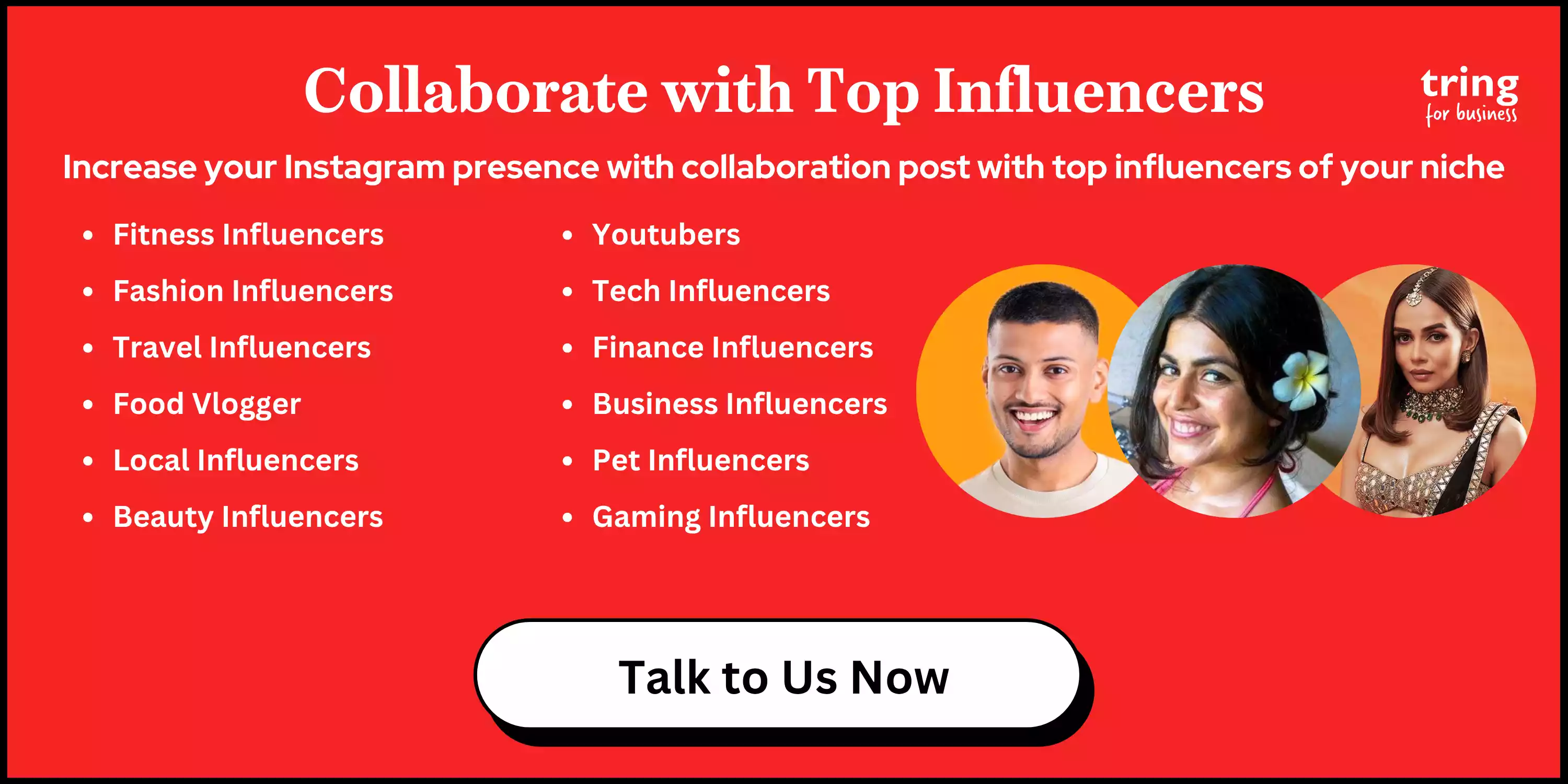What is Affiliate Marketing?
Affiliate marketing is a performance-based strategy where individuals or affiliates promote a company’s products or services and earn a commission for each sale or lead generated through their referral. Affiliates use various channels like blogs, websites, or social media to share unique affiliate links that track customer actions. When someone makes a purchase or completes a desired action using that link, the affiliate receives a percentage of the revenue.
Affiliate marketing is widely used across industries because it’s cost-effective, scalable, and results-driven, making it an attractive option for businesses looking to expand their reach.
What is Influencer Marketing?
Influencer marketing is a strategy where brands partner with individuals who have a strong online presence and loyal followers, such as social media influencers, bloggers, or celebrities, to promote products or services. These influencers create authentic content around the brand, sharing it with their audience in ways that feel natural and engaging.
Unlike traditional advertising, influencer marketing benefits from the trust and credibility that influencers have built with their followers. This creates a more personal connection, making product recommendations feel genuine.
As social media continues to grow, influencer marketing has become a popular and impactful tool for brands to connect with consumers.
![]()
Difference Between Affiliate and Influencer Marketing
Let’s understand the difference between affiliate marketing and influencer marketing. This table is to help you decide which one you should opt for your campaign goals.
|
Aspect
|
Affiliate Marketing
|
Influencer Marketing
|
|
Payment Model
|
Commission-based (paid for sales or leads)
|
Upfront fees or free products (sometimes performance-based bonuses)
|
|
Primary Focus
|
Driving conversions and sales
|
Building brand awareness and audience engagement
|
|
Partnership Length
|
Often long-term with continuous commissions
|
Typically short-term or campaign-specific partnerships
|
|
Promotion Channels
|
Blogs, websites, email marketing, and affiliate networks
|
Social media platforms (Instagram, YouTube, TikTok, etc.)
|
|
Tracking & Measurement
|
Based on conversion rates, sales, and clicks
|
Measured through likes, shares, comments, and reach
|
|
Audience Targeting
|
Wide-reaching, often broader audiences
|
Targeted, niche audiences with personal connection
|
|
Cost to Business
|
Low upfront cost, pay-per-result
|
Higher upfront cost, but varies based on influencer’s reach
|
|
Credibility & Authenticity
|
Depends on the affiliate’s reputation and transparency
|
Uses influencer's credibility and trust with followers
|
|
Scalability
|
Easily scalable with multiple affiliates
|
More challenging to scale due to individual partnerships
|
Benefits of Affiliate Marketing
![Benefits of Affiliate Marketing Benefits of Affiliate Marketing]()
-
Cost-Effective: Affiliate marketing is highly budget-friendly because businesses only pay when a desired action, such as a sale or lead, is completed. Unlike traditional brand advertising, where costs are incurred upfront regardless of results, this model ensures that companies spend money only when they see tangible outcomes, making it low-risk and high-reward.
-
Scalable: As a business grows, affiliate marketing allows for easy scalability. Brands can collaborate with multiple affiliates, each targeting different audiences or platforms, without significantly increasing the cost or effort. This flexibility allows businesses to expand their marketing reach while keeping control over the budget.
-
Performance-Based: Affiliate marketing is rooted in results. Payments are tied directly to conversions, meaning that businesses pay for performance, not for exposure. This ensures a strong return on investment (ROI), as affiliates are motivated to drive high-quality traffic that results in sales or leads.
-
Increased Reach: By partnering with affiliates who have their own established audiences, brands can tap into new customer segments that may not have been reached through traditional marketing efforts. Affiliates use platforms like blogs, websites, and social media to promote products, expanding the brand’s presence across various online channels.
-
Easy to Track: With sophisticated tracking tools and software, businesses can easily monitor the performance of their affiliate partners. Metrics like clicks, sales, and conversions can be tracked in real time, allowing for better analysis and optimization of the campaign for improved results. This transparency ensures both businesses and affiliates are aligned on performance goals.
Benefits of Influencer Marketing
![Benefits of Influencer Marketing Benefits of Influencer Marketing]()
-
Enhanced Brand Awareness: Influencers have established, loyal followings, making them powerful channels for boosting a brand’s visibility. When influencers promote a product or service, they expose it to a larger audience that may not be familiar with the brand, helping increase awareness. This can be especially useful for brands looking to expand into new markets or reach niche audiences that are harder to engage through traditional marketing methods.
-
Authentic Content: One of the biggest advantages of influencer marketing is the authentic content influencers create. Influencers are known for their unique voice and personal connection with their audience, so when they recommend a product, it often feels genuine and trustworthy. This authenticity resonates with followers, making them more likely to trust the endorsement, unlike traditional ads which can sometimes feel forced or disconnected.
-
Targeted Reach: Influencer marketing allows brands to target specific groups effectively. By partnering with influencers who align with their niche or industry, brands can ensure that their message reaches a relevant audience that is genuinely interested in their products or services. For example, a beauty brand can work with beauty influencers, guaranteeing that their products are seen by people who care about skincare or makeup.
-
Higher Engagement: Influencers typically have high levels of engagement with their followers. When they share content, their audience is more likely to engage with it through likes, comments, shares, and even purchases. This kind of interaction creates a ripple effect, further increasing the brand’s reach and encouraging organic conversations about the product.
-
Social Proof and Credibility: When an influencer endorses a product, it acts as a form of social proof, which can significantly boost the brand’s credibility. Followers view the influencer’s endorsement as a trusted recommendation, and this can sway their purchasing decisions. The more reputable the influencer, the stronger the trust and social proof they lend to the brand, helping build consumer confidence and drive sales.
![]()
Since influencer marketing impact on sales is huge, we encourage you to start an influencer marketing program right away.
How To Start Affiliate Marketing Campaigns?
Starting an affiliate marketing campaign can be a cost-effective way to grow your business by using the marketing efforts of affiliates. Here’s a step-by-step guide on how to get started:
1. Choose the Right Affiliate Program
The first step is selecting the right affiliate program. You can either join an existing affiliate network like Amazon Affiliates or create your own in-house program. If you choose an established network, it’s easier to find affiliates, as these platforms already have a wide pool of marketers. Alternatively, building your own program allows for more control over commissions, rules, and partnerships.
2. Know Your Audience
Understand who your target audience is and where they spend time online. This will help you select affiliates who can effectively promote your products to the right people. Your audience may vary depending on your niche, so take the time to conduct market research and identify the channels where they are most active.
3. Select the Right Affiliates
Choosing the right affiliates is crucial for the success of your campaign. Look for affiliates who have a good reputation, a strong following in your niche, and the ability to drive quality traffic. This might include bloggers, influencers, or website owners with a loyal audience. A good affiliate partner should align with your brand values and target audience to ensure they can effectively promote your products.
4. Create Attractive Commission Structures
Offer competitive commissions to incentivize affiliates. Commissions can be a flat fee or a percentage of the sale. Ensure your rates are attractive enough to motivate affiliates to promote your products but still sustainable for your business. You can also offer tiered commissions, where high-performing affiliates receive increased earnings based on their results.
5. Provide Marketing Resources
To help affiliates succeed, provide them with high-quality marketing materials. This might include banners, product images, sales copy, and links. The easier you make it for affiliates to promote your products, the more likely they are to be successful. Providing clear guidelines on your brand message and target audience also ensures consistent and effective promotions.
6. Track and Optimize Your Campaign
Once your campaign is live, it’s important to track performance. Use tools like Google Analytics, affiliate tracking software, or your affiliate network’s built-in tools to monitor clicks, conversions, and overall sales. Regularly analyze the data to identify what’s working and what needs improvement. You may need to optimize commission rates, refine marketing materials, or focus on recruiting high-performing affiliates.
By following these steps, you can launch a successful affiliate marketing campaign that drives traffic, generates sales, and builds long-term relationships with your affiliates.
How To Start Influencer Marketing Campaigns?
Launching an influencer marketing campaign can significantly enhance your brand's visibility and engagement. Here’s how you can start your influencer marketing journey effectively.
1. Define Your Goals
Before diving into influencer marketing, clearly outline your campaign goals. Are you looking to increase brand awareness, drive website traffic, or boost sales? Defining specific, measurable objectives will guide your strategy and help you assess the campaign's success later.
2. Identify Your Target Audience
Understanding your target audience is crucial. Identify their demographics, interests, and the platforms they use. This knowledge will help you choose influencers who can effectively connect with your desired audience. For instance, if your target market consists of young adults interested in fashion, look for influencers who specialize in that niche.
3. Choose the Right Influencers
Selecting the right influencers is essential for a successful campaign. Look for individuals who align with your brand values and resonate with your target audience. Consider factors such as their follower count, engagement rates, and authenticity. Micro-influencers, who have smaller but highly engaged audiences, can often provide more value than larger influencers due to their strong connections with followers.
4. Establish Clear Collaboration Terms
Once you’ve identified potential influencers, reach out to them to discuss collaboration terms. Be transparent about your expectations, including deliverables, timelines, and compensation. Compensation can vary from monetary payments to free products or services. Establishing clear guidelines ensures that both parties are on the same page and helps prevent misunderstandings.
5. Create Engaging Content Together
Collaborate with influencers to create authentic and engaging content that showcases your products or services. Allow them the creative freedom to present your brand in their own style while ensuring the message aligns with your brand values. Authenticity is key in influencer marketing, as audiences are more likely to engage with genuine content.
6. Monitor and Measure Performance
Once the campaign is live, actively monitor its performance. Use analytics tools to track metrics such as reach, engagement, website traffic, and sales conversions. This data will help you evaluate the campaign's effectiveness and make necessary adjustments in real-time.
7. Build Long-Term Relationships
Successful influencer marketing is not just about one-off campaigns. Aim to build long-term relationships with influencers. This approach fosters authenticity and loyalty, as influencers who genuinely believe in your brand can become lasting advocates. Regular collaboration can lead to deeper connections with their audience, resulting in sustained brand awareness and engagement.
By following these steps, you can launch an effective influencer marketing campaign that boosts your brand's visibility, drives engagement, and builds lasting relationships with both influencers and your audience.
![]()
Choosing the Right Strategy for Your Business
Deciding between influencer marketing and affiliate marketing for your business involves analyzing several key factors that align with your goals, audience, and budget. Both strategies can effectively boost your brand’s visibility and sales, but understanding their differences will help you choose the best fit for your needs.
1. Understand Your Campaign Objective
Begin by clarifying your primary objectives. If your goal is to raise brand awareness and connect with your audience on a personal level, influencer marketing might be more suitable. Influencers can create authentic content that resonates with their followers, thereby enhancing your brand's visibility. Conversely, if your aim is to drive conversions and track sales directly, affiliate marketing may be the better option. Affiliates focus on generating leads or sales through their promotional efforts, and their performance can be directly measured through commissions.
2. Set Your Budget
Budget considerations play a significant role in your decision. Influencer marketing often requires a higher upfront investment, especially when partnering with well-known influencers. You may need to pay for content creation, product samples, and campaign management. However, the long-term benefits of building brand loyalty and recognition can outweigh these costs. Affiliate marketing, on the other hand, is generally performance-based, meaning you only pay affiliates when they drive sales or leads. This can make it a more cost-effective approach, especially for businesses with tighter budgets.
3. Consider the Nature of Your Product
The type of product or service you offer can also influence your decision. If your offerings benefit from visual storytelling, influencer marketing can showcase them in action, appealing to consumers’ emotions and encouraging engagement. Conversely, if your product requires detailed explanations, comparisons, or reviews, affiliate marketing may be more appropriate, as affiliates often produce in-depth content that educates consumers before they make a purchase.
4. Long-Term vs. Short-Term Strategy
Consider whether you want a short-term campaign or a longer-term relationship. Influencer marketing can create lasting brand loyalty if influencers genuinely connect with your brand over time. On the other hand, affiliate marketing often focuses on immediate conversions and may not foster the same level of brand loyalty.
5. Assess Your Resources
Finally, consider your available resources. Influencer marketing may require more hands-on management and creative input, while affiliate marketing can be more streamlined once established. Assess whether your team has the capacity to manage relationships with influencers or if you would prefer the more automated process that comes with affiliate partnerships.
Ultimately, the choice between influencer marketing and affiliate marketing depends on your specific business needs and goals.
Can You Do Both?
Yes, a business can combine both influencer marketing and affiliate marketing to maximize its reach and results. Using influencer marketing, brands can build awareness and trust through authentic content created by influencers, engaging their audiences on social media or video platforms. Meanwhile, affiliate marketing focuses on driving direct sales through performance-based promotions where affiliates earn commissions for conversions.
By integrating both strategies, businesses can use influencers to boost visibility and then track sales through affiliate links. Influencers can act as affiliates by sharing unique links with their followers, blending the trust of influencer endorsements with the measurable outcomes of affiliate marketing. This hybrid approach helps reach a wider audience while maintaining accountability for performance, providing a balanced, cost-effective way to grow brand awareness and drive conversions simultaneously.
Get a Famous Influencer For Your Business!
Absolutely Yes!
We make it easy to connect with the perfect talent for your business. Whether you want to create buzz, increase engagement, or drive sales, partnering with the right celebrity or influencer can make a powerful impact. Their endorsement can boost your brand’s credibility and reach new customers.
Get started today and watch your brand grow with the right influencer partnerships!
![]()
![birthday occasion]() Birthday Gifts
Birthday Gifts
![anniversary occasion]() Anniversary Gifts
Anniversary Gifts
![women]() Women
Women
![men]() Men
Men
![Couples]() Couples
Couples
![Couples]() Wedding Gifts
Wedding Gifts

 Birthday Gifts
Birthday Gifts
 Women
Women
 Men
Men
 Anniversary Gifts
Anniversary Gifts
 Wedding Gifts
Wedding Gifts




 We now support international payments
We now support international payments
